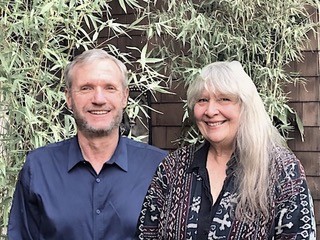Diablo Gazette – Wear Gratitude Like a Cloak
March 14th, 2021

Co-authored by Dr. Holly Holmes-Meredith and Bill Yarborough.
Rumi said it best: “Wear gratitude like a cloak, and it will feed every corner of your life.” The wisdom that gratitude provides many benefits is not new, even the beloved 13th-century Persian Poet knew it. Rumi just lacked scientific research and an MRI to prove it. Rumi is not the only historic figure to praise gratitude.
Research on the influence of gratitude is extensive. Much has been published on its benefits for psychological and physical health. For example, scientific findings have found the practice of gratitude can reduce many toxic emotions, ranging from envy and resentment to frustration and regret. Similarly, researchers confirmed that gratitude can reduce depression and increase happiness. Even MRI scans show gratitude may have a lasting positive effect on the brain.
Other studies found gratitude to be more successful than other psychological therapies and healing techniques. In one study, over 400 individuals were tested on the impact of various therapeutic interventions. The individuals were asked to write and personally deliver a letter of gratitude to someone who they hadn’t thanked for a kindness. When they did so, the individuals immediately experienced a huge increase in their happiness scores, greater than all other psychological interventions in the study. Another study linked maintaining an evening gratitude journal to longer and better sleep.
The healing power of gratitude also extends to overcoming trauma. For example, Vietnam War Veterans practicing higher levels of gratitude were found to experience lower rates of Post-Traumatic Stress Disorder. Grateful people generally experience fewer aches and pains and report feeling healthier than others do.
So how do you cultivate this miraculous “cure-all” called gratitude? Here are a few suggestions to follow:
Write a thank-you note. You can nurture your relationship with other people by writing a thank-you letter, expressing your enjoyment and appreciation of that person’s impact on your life. Send it to them, or better yet, deliver and read it in person if possible. Make a habit of sending at least one gratitude letter a month. You can occasionally write one to yourself.
No time to write? Thank someone mentally. It may help to think of somebody who has done something nice for you and mentally thank the individual.
Keep a gratitude journal. Make a habit of writing down or sharing thoughts about the gifts you have received each day.
Count your blessings. Pick a time every week to list your blessings, reflecting on the things that went right for which you feel gratitude. It helps to pick a number, such as three to five things you plan to identify each week. As you write, be specific and think of the sensations you felt when something positive happened.
Pray. People who are religious can use prayer to cultivate gratitude.
Meditate. Mindfulness meditation involves focusing on the present moment without judgment. Although people often focus on a word or phrase (such as ”peace”), why not focus on what you are grateful for, such as the warmth of the sun or a pleasant sound?
Through gratitude, people acknowledge the goodness in their lives. In the process, they usually recognize the source of goodness lies at least partially outside themselves. As a result, gratitude helps people connect to something larger than themselves, such as with other people, nature, or a higher power.
Like the great sage Willie Nelson said: “When I started counting my blessings, my whole life turned around.”
If you have questions or comments, please reach out to us via the contact information on our websites: Holly@hypnotherapytraining.com or Bill on this website’s contact page.
By Dr. Holly Holmes-Meredith, D. Min., MFT, Board Certified Clinical Hypnotherapist and Bill Yarborough, CHT, and Certified EFT Practitioner.
Below is the link to the March 2021 July Diablo Gazette. Our Emotional Health column is on page 7.
Categories: Emotional Health, Emotional Health Articles, gratitude, post traumatic stress disorder, PTSD